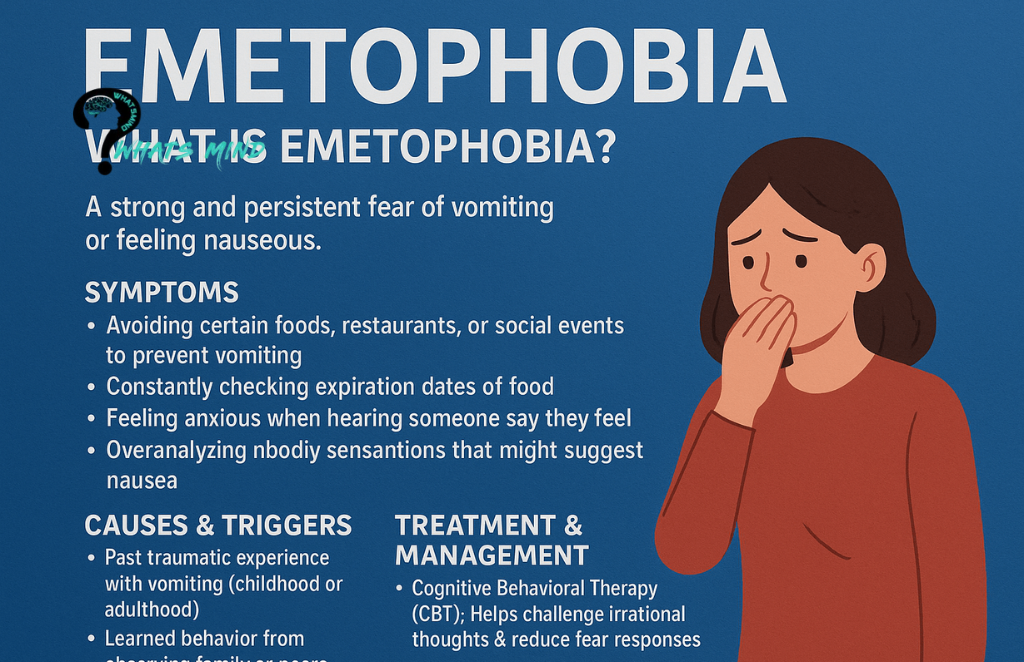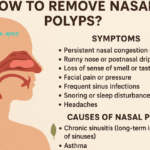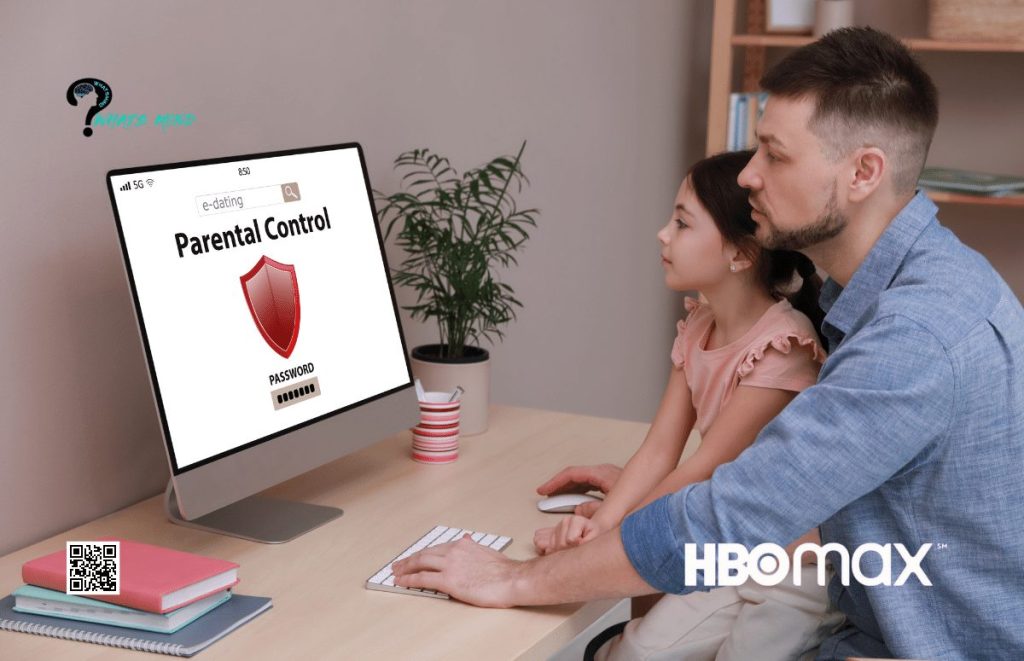Have you ever heard of emetophobia or have you practiced it by yourself? If No, then you get a complete understanding of this phobia in this article so read it carefully. Emetophobia is a mental health state in which you have an extreme fear of vomiting, being sick, or throwing up. Vomit is not something that people enjoy carrying. If you experience vomit phobia you are persistently stressed about throwing up and it can catch over your reasoning.
This terror influences your daily life activities and social gatherings not just feeling afraid. It can stop you from easing up, being involved in social activities, and eating or trying new foods, and nutritive food. Vomit phobia is a particular phobia in the DSM-5 (Diagnostic and Statistical Manual of Mental Disorders). Vomit phobia also causes anxiety and panic attacks after uncovering or assuming the object and situation you are fear of.
If you feel like you have to vomit or notice vomiting, you may be fear of being unable to stop vomiting, ashamed, and losing control of anxiousness. Vomit phobia is a rare and complex phobia that affects 0.1% of pupils across the world. It’s most common among females and individuals who have agoraphobia (social anxiety disorder).
If you have an intense fear of Emetophobia then you should consult psychotherapists, they treat your phobia by applying Cognitive Behavioural Therapy and Exposure Response Therapy to alter your irrational thoughts to rational ones. If you like me very light phobia of vomiting during traveling then the best solution is to stay hydrated by taking Lemon, oranges, peppermint, and Ginger tea believe these tips are effective for vomiting.
In this article, we discuss Emetophobia, its diagnosis, symptoms, causes, barriers, and treatments.
Brief Outlook Of Emetophobia
It is a particular phobia that evolves into an intense fear of vomiting, seeing vomit, looking at anybody’s vomit, or feeling anxious about throwing up. People with vomit phobia mostly live with anxiety and are involved in behaviors that influence their daily life activities. Many individuals don’t like vomiting, but hardly does it overwhelms their thought patterns.
People with Emetophobia, in contrast, use up a lot of time stress about vomiting and going sick themself. Just the feeling that somebody could vomit is sometimes more likely to cause extreme distress. This ongoing struggle can have a big effect on how you live.
For example, you may not explore a new restaurant, ignore rushed places or traveling, never try new foods taste, keep away from individuals who may be ill or hospitalized, and constantly check your health. For most pupil with vomit phobia, the mental condition impacts almost every part of their life incidents and their interpersonal relationships.
How To Diagnose If Someone Has Emetophobia
If you have vomit phobia and you go for a physician later always smart physician advises you to go to a mental health professional. Only a psychologist or psychiatrist can help you to diagnose vomit phobia. A psychotherapist will diagnose vomit phobia set of questions about your case history, feelings, and symptoms.
Generally, your permanent fear and stress about vomiting occur for a minimum of six months to be recognized as vomit phobia. Your psychologist will see the criteria in the DSM-5 to diagnose Emetophobia.
DSM stands for Diagnostic and Statistical Manual of Mental Disorders, in this book, you get a complete detail of all types of disorders and their criteria, this book was published by the American Psychiatric Association. Your therapist also examines the physical and mental health situations including:
- Severe and illogical fear means fear of vomiting is a permanent and extreme level of fear.
- Impatient anxiety means you attend to live on or terrifying future thoughts of nausea and vomiting.
- You constantly keep away from vomiting and objects that might cause it.
- You may go to excessive traveling to try to avoid vomiting.
This vomit phobia particularly affects your interpersonal relationships and your daily activities.
Symptoms Of Emetophobia
In Emetophobia, you have experienced both physical and psychological symptoms. Having vomit phobia means that you surely make notable efforts to stay away from situations where you or others might vomit.
Physiological Symptoms
- Get rid of foods or places that you connected with vomiting
- Never consume new foods or new liquid refreshments.
- Consuming leisurely, eating very small portions of food, and eating in one’s house.
- Before eating detect the smell of food and examine food frequently to ensure it hasn’t spoiled or discard food before it expires.
- Excessive cooking of all foods like vegetables and meat.

- Never touch exteriors that could have bacteria that produce illness, including flushed toilet seats, door handles, hand railings, and public appliances.
- keep away from hospitals or medical centers where individuals are hospitalized or might vomit
- Utilizing gastric antacids to stop feelings of vomiting and stomach disturbance before they arise.
- Unnecessarily watch your physical well-being through temperature taking.
Obsessive Compulsive Disorder (OCD) Symptoms
- Washing hands, serving dishes, food, and food preparing utensils, unreasonably.
- Prevent oneself from drinking alcohol or taking medicines that cause feelings of nausea.
- keep away from travel, school, functions, local transportation, or any cram-full civic areas.
- Ignoring the use of specific words, such as burf, vomit, and puke.
Psychological Symptoms
- Experience difficulty in breathing heaviness in the chest, or fast heart rate at the thought of vomit.
- Extreme fear or panic attacks when an individual sees someone vomit.
- Intense fear of vomiting and inability to find a bathroom.
- Intense fear of uncontrollable throwing up.
- Intense fear of suffocation on vomiting.
- Stress at the thinking of shame due to vomiting.
- Panic attacks at the idea of not being able to leave a crowded place if anybody vomits.
- Severe anxiety and discomfort when feeling nauseated or thought about vomiting.
- Intense fear of becoming ill and going to the clinics.
Causes Of Emetophobia
Certain phobias frequently develop afterwards a particular incident. The incident experience builds an association between a thing which may be a feeling, a situation, a happening, and fear.
The reason for vomit phobia including
- Get to be very sick in public.
- Seeing an awful victim of food poisoning.
- Having severe vomiting during essential vacations.
- Face anybody who vomits on yourself.
- Encounter a panic attack throughout the time of vomiting.
Emetophobia can also occur without a direct cause, well known therapist trusts that genetics and their environment contribute to this phobia. For example, undergoing a family history of social phobias or other anxiety disorders can increase your phobia symptoms.
Individuals with vomit phobia consistently encounter the fear in the period of childhood or adolescence. Many individuals with vomit phobia are female and young boys. Some phobias are sometimes chronic, long-standing for years or a lifetime.

Usually, the vomit phobia begins slowly and grows in severity within time if not properly treated. Individuals with vomit phobia commonly start to keep away from places, activities, and things they link with vomiting. You may completely escape trying new foods or going to specific areas therefore, the fear can increase over time.
What Are The Berries Of Emetophobia
Some intense difficulties can happen with emetophobia, and its signs can become more complicated. Therefore. Overcoming the symptoms of vomit phobia can become more difficult such as
- Poor Diet
- Water deficiency in the body means dehydration.
- Agoraphobia (Social phobia )
- Social insulation lack of human interaction.
- Depression and excessive anxiety.
Treatment Of Emetophobia
Psychologists used two therapeutic techniques to overcome the symptoms of vomit phobia.
- Cognitive Behavioural Therapy (CBT)
- Exposure Therapy
If therapies did not overcome the symptoms then psychiatric used medications.
Cognitive Behavioral Therapy (CBT)
CBT examines the certain thoughts and emotions you have linked with Emetophobia. Mostly, individuals with phobias have developed negative thought patterns that are not based on reality. For example, when you undergo a particular fear, you might have a likelihood of catastrophic. In catastrophic you imagine the normal scenario to be a worst nightmare and this can increase your anxiety level. CBT helps you explore cognitive misrepresentation. These are irrational thought patterns that are not present. Once you have explored these thoughts, you can displace them with more rational ones. When you are engaging in the extreme fear of a phobic episode then effective CBT can assist you:
- Recall yourself that you are undergoing a vomit phobia.
- Mention that the phobic episode will be finished soon.
- Discover the thoughts and feelings that are bigger than your fear.
- Displace the irrational fear of vomit and negative thoughts with the announcement “Don’t be afraid to throw up it’s common in some people it never hurts you” that is more realistic.
Exposure Therapy
It is a kind of behavioral therapy, in this therapy most psychotherapists start by training you in relaxation methods that can relax you when you have extreme stress. Another technique used by exposure therapy is systematic desensitization. This is the most effective method in which you are slowly exposed to fear arousing situations from less dangerous to most dangerous.
Once you are qualified to relax under pressure then you and your therapist can construct a hierarchy (list) of thoughts related to your vomit phobia. Such as the least fears placed at the bottom and the extreme fears placed at the top. It is a technique of slowly presenting you closer to something you fear. It generally starts first in your mind’s eye then in numerous representations like in cartoons, drawings, or photographs forms.

As you proceed toward each one, your therapist teaches you to utilize your relaxation techniques to decrease your anxiety level. Once you can diminish anxiety related to one kind of problem, you and your psychotherapist can move to the next level on your hierarchy. The aim of systematically desensitizes you to the particular phobia, so it no longer initiates the same symptoms and gets to be in the way of you spending your life wonderfully.
Medications
Firstly there is no need to intake medicine for Emetophobia, therapies are the best solution to overcome the symptoms of your phobia. But if your symptoms are going to be severe then you intake medicine.
- For some individuals, tranquilizers (benzodiazepines) can help decrease the severity of anxiety signs during a phobia arousing.
- Beta-blocking drugs can also be used to treat your anxiety regarding vomit phobia. They prevent the effect of the Adrenaline’s hormone ( this hormone prepares you for stressful ful r for worrying situations).
Both types of drugs have issues and side effects, so it’s better to consult with mental health professionals before using them.
Conclusion
In conclusion, Emetophobia is a particular phobia that absorbs an intense fear of vomiting, seeing vomit, looking at other individuals vomit, or feeling ill. Individuals with vomit phobia mostly dwell with anxiety and arrest in behaviors that affect their interpersonal relationships.
If you have a vomit phobia, contact a psychotherapist they teach you effective methods how to control your symptoms and to accurately the incorrect thoughts that arouse your anxiety. Exposure therapy is the benchmark for overcoming the symptoms of vomit phobia. Many individuals have also met favorable outcomes with cognitive behavioral therapy.
CBT’s purpose is to displace irrational thoughts with realistic or logical ideas about what is afraid of you. If you have ever accomplished a vomit phobia, you know that the fear you feel is not logical. However utilizing practical, comprehensive therapies or drugs that can show you calmness and aid you unlearn the terrible reaction that may be disturbing your daily life activities and interpersonal relationships.
Lastly, in this article, you get a whole detail about Emetophobia and how to overcome it. Tell us in the comments below which phobia you faced in your life and how to overcome it. And start a chain to help people and support them in overcoming their particular phobias. Thank You!
FAQs
1: What is the fastest way to cure Emetophobia?
In this phobia, you have an extreme fear of vomiting especially when you are traveling. There are two main therapies for vomit phobia. First Cognitive Behavioural Therapy (CBT), in this therapy persons can gain an understanding of healthier coping techniques, slowly face their fears, and change their thought patterns to positive ones. Second Exposure Response
Prevention therapy (ERP) In this therapy individuals expose slowly with emetophobia to the condition or feeling that they fear, but in a safe and protective environment.
2: How bad can vomit phobia get?
If you have a vomit phobia you are continuously stressing about vomiting and it can seize over your thinking. This terror influences your life except just feeling scared. It can stop you from taking part in social gatherings or eating complete, nutritious food.
3: What is the root cause of Emetophobia?
It can spread after a distressing vomiting experience or without a clear cause. Running into a family history of certain phobias or other social anxiety disorders can extend your issue. Vomit phobia is nearly associated with obsessive-compulsive disorder. Because it has obsession or compulsion.
You may like to read about the following:
- Risperidone: Understanding, Utilisation, Way Of Consuming, Precautions, Storage, Side Effects, FAD Warning
- Gabapentin Ruined my Life is Real or a Hoax?
- How Doxycycline Ruined My Life, Side Effects, Case Study, Reviews
- Rtasks Login: Introduction, Login Access, Features, Merits, Demerits, Troubleshooting Errors & Password Reset
For more information, visit Whatsmind.com















